#lost in transit
Text



The insanity of The Conductor™
The beloved mascot of this hellscape + the antagonist of an original story, [Lost In Transit], which I plan to put out someday!!
Yes these were my antics during my break and I am not proud TvT
[ READ MORE for bonus stuff!! ]
Some sillies:
The Conductor oversees "Point Nemo," a station that isn't a part of any railway system. Legends say that those who want to disappear or don't feel like they belong anywhere wind up in this place.
They claim to be married to a mannequin named "Irene," yet this is completely false and just them being delulu and desperate.
For some wildass reason, she uses a Christmas tree as one of their weapons. This is beyond strange, as the area they inhabit, which is an island, does not have any Pine trees in the vicinity.
[ The green string seems familiar, does it not? Wonder where we first saw that referenced... ]
#lost in transit#the conductor#original character#my art heh#[ rambling section ]#they live in my head rent free#and yes she definitely goes ''choo choo'' every now and then#very silly antag... may or may not be connected to a certain jester?! we shall see
133 notes
·
View notes
Video
youtube
Lost In Transit - LOST IN TRANSIT
2 notes
·
View notes
Photo
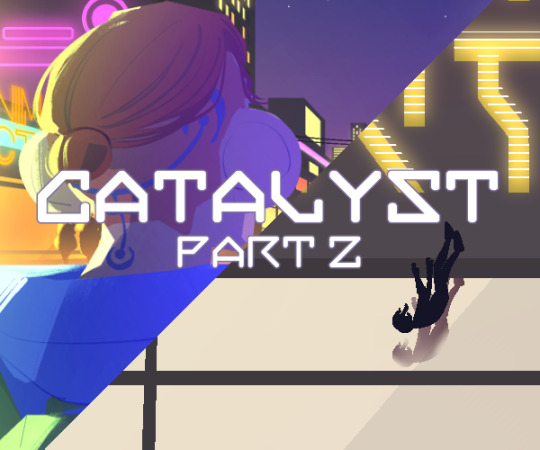
Aubrey's day goes from bad to worse. Decisions are made. Crises are had. The clock ticks ever closer to midnight. While the NeoScum reckon with unfathomable enemies in Los Angeles, Aubrey finally caves to the mounting pressure to turn and face the demons that have been chasing her for so long.
Tonight is the night where everything changes, forever.
The long-awaited PART 2 of CATALYST is now available to read on my website.
6 notes
·
View notes
Text

Lmao sorry some of you might lose some packages soon 🤷♀️
#someone’s getting fired for this lmao#trains#supply lines#shipping containers#lost in transit#union pacific#oops
0 notes
Text

wiki was an angel
#lucy#wiki#angel#my art#art#lesbian#she transed from weird genderless ring creature to a woman#just kinda like how i feel#pre transition i felt lost#now i am a woman#i wish i could have a magic angel power to have the exact body i want#but i like how i look regardless
1K notes
·
View notes
Text
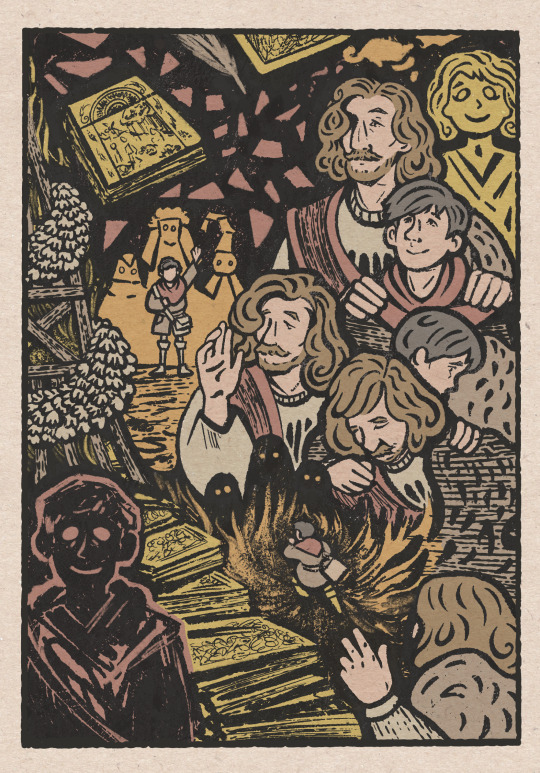
thinkin' about caspar...
#thinkin' HARD#pentiment#andreas maler#caspar of salzburg#august maler#my art#can i do the thing you're not supposed to do and explain the piece#i'm really proud of the idea#there's four sets of drawings in this#each pair mirrors each other in composition/subject with one representing the start of the second act and the other representing the end#and they're tiled to work chronologically#(super super spoiler warnings for act 2)#so you start top right with the ghost of august#who's standing behind haunting andreas' interactions with caspar#as he holds caspar's shoulders and takes on that lost fatherly role#near them is andreas' masterwork and what's probably a copy of it in progress by caspar#you move on to see andreas leaving caspar alone by the fire at saint john's eve#flanked by three people masked to protect themselves from spirits#and then transition into caspar pulling andreas out of the fire at the abbey#(with his hands on andreas' shoulders now)#then caspar running into the fire toward three spirits- with andreas no longer waving goodbye but trying to call him back to him#then the books caspar saved#and then the ghost of caspar- mirroring august as a son andreas lost#and no#no i'm not ok!!!!#please talk to me about this arc i can't get over it 😭
1K notes
·
View notes
Text
In defense of bureaucratic competence
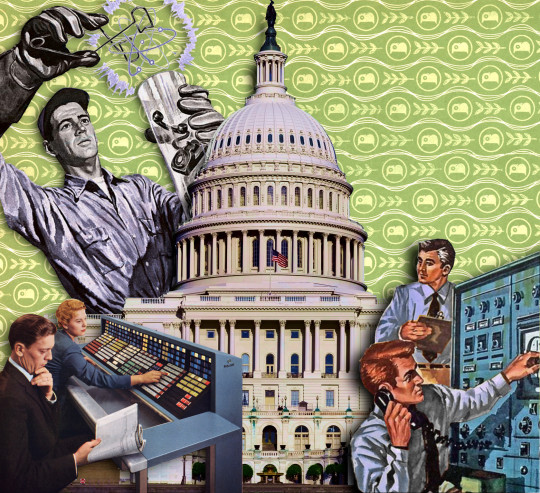
Sure, sometimes it really does make sense to do your own research. There's times when you really do need to take personal responsibility for the way things are going. But there's limits. We live in a highly technical world, in which hundreds of esoteric, potentially lethal factors impinge on your life every day.
You can't "do your own research" to figure out whether all that stuff is safe and sound. Sure, you might be able to figure out whether a contractor's assurances about a new steel joist for your ceiling are credible, but after you do that, are you also going to independently audit the software in your car's antilock brakes?
How about the nutritional claims on your food and the sanitary conditions in the industrial kitchen it came out of? If those turn out to be inadequate, are you going to be able to validate the medical advice you get in the ER when you show up at 3AM with cholera? While you're trying to figure out the #HIPAAWaiver they stuck in your hand on the way in?
40 years ago, Ronald Reagan declared war on "the administrative state," and "government bureaucrats" have been the favored bogeyman of the American right ever since. Even if Steve Bannon hasn't managed to get you to froth about the "Deep State," there's a good chance that you've griped about red tape from time to time.
Not without reason, mind you. The fact that the government can make good rules doesn't mean it will. When we redid our kitchen this year, the city inspector added a bunch of arbitrary electrical outlets to the contractor's plans in places where neither we, nor any future owner, will every need them.
But the answer to bad regulation isn't no regulation. During the same kitchen reno, our contractor discovered that at some earlier time, someone had installed our kitchen windows without the accompanying vapor-barriers. In the decades since, the entire structure of our kitchen walls had rotted out. Not only was the entire front of our house one good earthquake away from collapsing – there were two half rotted verticals supporting the whole thing – but replacing the rotted walls added more than $10k to the project.
In other words, the problem isn't too much regulation, it's the wrong regulation. I want our city inspectors to make sure that contractors install vapor barriers, but to not demand superfluous electrical outlets.
Which raises the question: where do regulations come from? How do we get them right?
Regulation is, first and foremost, a truth-seeking exercise. There will never be one obvious answer to any sufficiently technical question. "Should this window have a vapor barrier?" is actually a complex question, needing to account for different window designs, different kinds of barriers, etc.
To make a regulation, regulators ask experts to weigh in. At the federal level, expert agencies like the DoT or the FCC or HHS will hold a "Notice of Inquiry," which is a way to say, "Hey, should we do something about this? If so, what should we do?"
Anyone can weigh in on these: independent technical experts, academics, large companies, lobbyists, industry associations, members of the public, hobbyist groups, and swivel-eyed loons. This produces a record from which the regulator crafts a draft regulation, which is published in something called a "Notice of Proposed Rulemaking."
The NPRM process looks a lot like the NOI process: the regulator publishes the rule, the public weighs in for a couple of rounds of comments, and the regulator then makes the rule (this is the federal process; state regulation and local ordinances vary, but they follow a similar template of collecting info, making a proposal, collecting feedback and finalizing the proposal).
These truth-seeking exercises need good input. Even very competent regulators won't know everything, and even the strongest theoretical foundation needs some evidence from the field. It's one thing to say, "Here's how your antilock braking software should work," but you also need to hear from mechanics who service cars, manufacturers, infosec specialists and drivers.
These people will disagree with each other, for good reasons and for bad ones. Some will be sincere but wrong. Some will want to make sure that their products or services are required – or that their competitors' products and services are prohibited.
It's the regulator's job to sort through these claims. But they don't have to go it alone: in an ideal world, the wrong people will be corrected by other parties in the docket, who will back up their claims with evidence.
So when the FCC proposes a Net Neutrality rule, the monopoly telcos and cable operators will pile in and insist that this is technically impossible, that there is no way to operate a functional ISP if the network management can't discriminate against traffic that is less profitable to the carrier. Now, this unity of perspective might reflect a bedrock truth ("Net Neutrality can't work") or a monopolists' convenient lie ("Net Neutrality is less profitable for us").
In a competitive market, there'd be lots of counterclaims with evidence from rivals: "Of course Net Neutrality is feasible, and here are our server logs to prove it!" But in a monopolized markets, those counterclaims come from micro-scale ISPs, or academics, or activists, or subscribers. These counterclaims are easy to dismiss ("what do you know about supporting 100 million users?"). That's doubly true when the regulator is motivated to give the monopolists what they want – either because they are hoping for a job in the industry after they quit government service, or because they came out of industry and plan to go back to it.
To make things worse, when an industry is heavily concentrated, it's easy for members of the ruling cartel – and their backers in government – to claim that the only people who truly understand the industry are its top insiders. Seen in that light, putting an industry veteran in charge of the industry's regulator isn't corrupt – it's sensible.
All of this leads to regulatory capture – when a regulator starts defending an industry from the public interest, instead of defending the public from the industry. The term "regulatory capture" has a checkered history. It comes out of a bizarre, far-right Chicago School ideology called "Public Choice Theory," whose goal is to eliminate regulation, not fix it.
In Public Choice Theory, the biggest companies in an industry have the strongest interest in capturing the regulator, and they will work harder – and have more resources – than anyone else, be they members of the public, workers, or smaller rivals. This inevitably leads to capture, where the state becomes an arm of the dominant companies, wielded by them to prevent competition:
https://pluralistic.net/2022/06/05/regulatory-capture/
This is regulatory nihilism. It supposes that the only reason you weren't killed by your dinner, or your antilock brakes, or your collapsing roof, is that you just got lucky – and not because we have actual, good, sound regulations that use evidence to protect us from the endless lethal risks we face. These nihilists suppose that making good regulation is either a myth – like ancient Egyptian sorcery – or a lost art – like the secret to embalming Pharaohs.
But it's clearly possible to make good regulations – especially if you don't allow companies to form monopolies or cartels. What's more, failing to make public regulations isn't the same as getting rid of regulation. In the absence of public regulation, we get private regulation, run by companies themselves.
Think of Amazon. For decades, the DoJ and FTC sat idly by while Amazon assembled and fortified its monopoly. Today, Amazon is the de facto e-commerce regulator. The company charges its independent sellers 45-51% in junk fees to sell on the platform, including $31b/year in "advertising" to determine who gets top billing in your searches. Vendors raise their Amazon prices in order to stay profitable in the face of these massive fees, and if they don't raise their prices at every other store and site, Amazon downranks them to oblivion, putting them out of business.
This is the crux of the FTC's case against Amazon: that they are picking winners and setting prices across the entire economy, including at every other retailer:
https://pluralistic.net/2023/04/25/greedflation/#commissar-bezos
The same is true for Google/Facebook, who decide which news and views you encounter; for Apple/Google, who decide which apps you can use, and so on. The choice is never "government regulation" or "no regulation" – it's always "government regulation" or "corporate regulation." You either live by rules made in public by democratically accountable bureaucrats, or rules made in private by shareholder-accountable executives.
You just can't solve this by "voting with your wallet." Think about the problem of robocalls. Nobody likes these spam calls, and worse, they're a vector for all kinds of fraud. Robocalls are mostly a problem with federation. The phone system is a network-of-networks, and your carrier is interconnected with carriers all over the world, sometimes through intermediaries that make it hard to know which network a call originates on.
Some of these carriers are spam-friendly. They make money by selling access to spammers and scammers. Others don't like spam, but they have lax or inadequate security measures to prevent robocalls. Others will simply be targets of opportunity: so large and well-resourced that they are irresistible to bad actors, who continuously probe their defenses and exploit overlooked flaws, which are quickly patched.
To stem the robocall tide, your phone company will have to block calls from bad actors, put sloppy or lazy carriers on notice to shape up or face blocks, and also tell the difference between good companies and bad ones.
There's no way you can figure this out on your own. How can you know whether your carrier is doing a good job at this? And even if your carrier wants to do this, only the largest, most powerful companies can manage it. Rogue carriers won't give a damn if some tiny micro-phone-company threatens them with a block if they don't shape up.
This is something that a large, powerful government agency is best suited to addressing. And thankfully, we have such an agency. Two years ago, the FCC demanded that phone companies submit plans for "robocall mitigation." Now, it's taking action:
https://arstechnica.com/tech-policy/2023/10/telcos-filed-blank-robocall-plans-with-fcc-and-got-away-with-it-for-2-years/
Specifically, the FCC has identified carriers – in the US and abroad – with deficient plans. Some of these plans are very deficient. National Cloud Communications of Texas sent the FCC a Windows Printer Test Page. Evernex (Pakistan) sent the FCC its "taxpayer profile inquiry" from a Pakistani state website. Viettel (Vietnam) sent in a slide presentation entitled "Making Smart Cities Vision a Reality." Canada's Humbolt VoIP sent an "indiscernible object." DomainerSuite submitted a blank sheet of paper scrawled with the word "NOTHING."
The FCC has now notified these carriers – and others with less egregious but still deficient submissions – that they have 14 days to fix this or they'll be cut off from the US telephone network.
This is a problem you don't fix with your wallet, but with your ballot. Effective, public-interest-motivated FCC regulators are a political choice. Trump appointed the cartoonishly evil Ajit Pai to run the FCC, and he oversaw a program of neglect and malice. Pai – a former Verizon lawyer – dismantled Net Neutrality after receiving millions of obviously fraudulent comments from stolen identities, lying about it, and then obstructing the NY Attorney General's investigation into the matter:
https://pluralistic.net/2021/08/31/and-drown-it/#starve-the-beast
The Biden administration has a much better FCC – though not as good as it could be, thanks to Biden hanging Gigi Sohn out to dry in the face of a homophobic smear campaign that ultimately led one of the best qualified nominees for FCC commissioner to walk away from the process:
https://pluralistic.net/2022/12/15/useful-idiotsuseful-idiots/#unrequited-love
Notwithstanding the tragic loss of Sohn's leadership in this vital agency, Biden's FCC – and its action on robocalls – illustrates the value of elections won with ballots, not wallets.
Self-regulation without state regulation inevitably devolves into farce. We're a quarter of a century into the commercial internet and the US still doesn't have a modern federal privacy law. The closest we've come is a disclosure rule, where companies can make up any policy they want, provided they describe it to you.
It doesn't take a genius to figure out how to cheat on this regulation. It's so simple, even a Meta lawyer can figure it out – which is why the Meta Quest VR headset has a privacy policy isn't merely awful, but long.
It will take you five hours to read the whole document and discover how badly you're being screwed. Go ahead, "do your own research":
https://foundation.mozilla.org/en/privacynotincluded/articles/annual-creep-o-meter/
The answer to bad regulation is good regulation, and the answer to incompetent regulators is competent ones. As Michael Lewis's Fifth Risk (published after Trump filled the administrative agencies with bootlickers, sociopaths and crooks) documented, these jobs demand competence:
https://memex.craphound.com/2018/11/27/the-fifth-risk-michael-lewis-explains-how-the-deep-state-is-just-nerds-versus-grifters/
For example, Lewis describes how a Washington State nuclear waste facility created as part of the Manhattan Project endangers the Columbia River, the source of 8 million Americans' drinking water. The nuclear waste cleanup is projected to take 100 years and cost 100 billion dollars. With stakes that high, we need competent bureaucrats overseeing the job.
The hacky conservative jokes comparing every government agency to the DMV are not descriptive so much as prescriptive. By slashing funding, imposing miserable working conditions, and demonizing the people who show up for work anyway, neoliberals have chased away many good people, and hamstrung those who stayed.
One of the most inspiring parts of the Biden administration is the large number of extremely competent, extremely principled agency personnel he appointed, and the speed and competence they've brought to their roles, to the great benefit of the American public:
https://pluralistic.net/2022/10/18/administrative-competence/#i-know-stuff
But leaders can only do so much – they also need staff. 40 years of attacks on US state capacity has left the administrative state in tatters, stretched paper-thin. In an excellent article, Noah Smith describes how a starveling American bureaucracy costs the American public a fortune:
https://www.noahpinion.blog/p/america-needs-a-bigger-better-bureaucracy
Even stripped of people and expertise, the US government still needs to get stuff done, so it outsources to nonprofits and consultancies. These are the source of much of the expense and delay in public projects. Take NYC's Second Avenue subway, a notoriously overbudget and late subway extension – "the most expensive mile of subway ever built." Consultants amounted to 20% of its costs, double what France or Italy would have spent. The MTA used to employ 1,600 project managers. Now it has 124 of them, overseeing $20b worth of projects. They hand that money to consultants, and even if they have the expertise to oversee the consultants' spending, they are stretched too thin to do a good job of it:
https://slate.com/business/2023/02/subway-costs-us-europe-public-transit-funds.html
When a public agency lacks competence, it ends up costing the public more. States with highly expert Departments of Transport order better projects, which need fewer changes, which adds up to massive costs savings and superior roads:
https://papers.ssrn.com/sol3/papers.cfm?abstract_id=4522676
Other gaps in US regulation are plugged by nonprofits and citizen groups. Environmental rules like NEPA rely on the public to identify and object to environmental risks in public projects, from solar plants to new apartment complexes. NEPA and its state equivalents empower private actors to sue developers to block projects, even if they satisfy all environmental regulations, leading to years of expensive delay.
The answer to this isn't to dismantle environmental regulations – it's to create a robust expert bureaucracy that can enforce them instead of relying on NIMBYs. This is called "ministerial approval" – when skilled government workers oversee environmental compliance. Predictably, NIMBYs hate ministerial approval.
Which is not to say that there aren't problems with trusting public enforcers to ensure that big companies are following the law. Regulatory capture is real, and the more concentrated an industry is, the greater the risk of capture. We are living in a moment of shocking market concentration, thanks to 40 years of under-regulation:
https://www.openmarketsinstitute.org/learn/monopoly-by-the-numbers
Remember that five-hour privacy policy for a Meta VR headset? One answer to these eye-glazing garbage novellas presented as "privacy policies" is to simply ban certain privacy-invading activities. That way, you can skip the policy, knowing that clicking "I agree" won't expose you to undue risk.
This is the approach that Bennett Cyphers and I argue for in our EFF white-paper, "Privacy Without Monopoly":
https://www.eff.org/wp/interoperability-and-privacy
After all, even the companies that claim to be good for privacy aren't actually very good for privacy. Apple blocked Facebook from spying on iPhone owners, then sneakily turned on their own mass surveillance system, and lied about it:
https://pluralistic.net/2022/11/14/luxury-surveillance/#liar-liar
But as the European experiment with the GDPR has shown, public administrators can't be trusted to have the final word on privacy, because of regulatory capture. Big Tech companies like Google, Apple and Facebook pretend to be headquartered in corporate crime havens like Ireland and Luxembourg, where the regulators decline to enforce the law:
https://pluralistic.net/2023/05/15/finnegans-snooze/#dirty-old-town
It's only because of the GPDR has a private right of action – the right of individuals to sue to enforce their rights – that we're finally seeing the beginning of the end of commercial surveillance in Europe:
https://www.eff.org/deeplinks/2022/07/americans-deserve-more-current-american-data-privacy-protection-act
It's true that NIMBYs can abuse private rights of action, bringing bad faith cases to slow or halt good projects. But just as the answer to bad regulations is good ones, so too is the answer to bad private rights of action good ones. SLAPP laws have shown us how to balance vexatious litigation with the public interest:
https://www.rcfp.org/resources/anti-slapp-laws/
We must get over our reflexive cynicism towards public administration. In my book The Internet Con, I lay out a set of public policy proposals for dismantling Big Tech and putting users back in charge of their digital lives:
https://www.versobooks.com/products/3035-the-internet-con
The most common objection I've heard since publishing the book is, "Sure, Big Tech has enshittified everything great about the internet, but how can we trust the government to fix it?"
We've been conditioned to think that lawmakers are too old, too calcified and too corrupt, to grasp the technical nuances required to regulate the internet. But just because Congress isn't made up of computer scientists, it doesn't mean that they can't pass good laws relating to computers. Congress isn't full of microbiologists, but we still manage to have safe drinking water (most of the time).
You can't just "do the research" or "vote with your wallet" to fix the internet. Bad laws – like the DMCA, which bans most kinds of reverse engineering – can land you in prison just for reconfiguring your own devices to serve you, rather than the shareholders of the companies that made them. You can't fix that yourself – you need a responsive, good, expert, capable government to fix it.
We can have that kind of government. It'll take some doing, because these questions are intrinsically hard to get right even without monopolies trying to capture their regulators. Even a president as flawed as Biden can be pushed into nominating good administrative personnel and taking decisive, progressive action:
https://doctorow.medium.com/joe-biden-is-headed-to-a-uaw-picket-line-in-detroit-f80bd0b372ab?sk=f3abdfd3f26d2f615ad9d2f1839bcc07
Biden may not be doing enough to suit your taste. I'm certainly furious with aspects of his presidency. The point isn't to lionize Biden – it's to point out that even very flawed leaders can be pushed into producing benefit for the American people. Think of how much more we can get if we don't give up on politics but instead demand even better leaders.
My next novel is The Lost Cause, coming out on November 14. It's about a generation of people who've grown up under good government – a historically unprecedented presidency that has passed the laws and made the policies we'll need to save our species and planet from the climate emergency:
https://us.macmillan.com/books/9781250865939/the-lost-cause
The action opens after the pendulum has swung back, with a new far-right presidency and an insurgency led by white nationalist militias and their offshore backers – seagoing anarcho-capitalist billionaires.
In the book, these forces figure out how to turn good regulations against the people they were meant to help. They file hundreds of simultaneous environmental challenges to refugee housing projects across the country, blocking the infill building that is providing homes for the people whose homes have been burned up in wildfires, washed away in floods, or rendered uninhabitable by drought.
I don't want to spoil the book here, but it shows how the protagonists pursue a multipronged defense, mixing direct action, civil disobedience, mass protest, court challenges and political pressure to fight back. What they don't do is give up on state capacity. When the state is corrupted by wreckers, they claw back control, rather than giving up on the idea of a competent and benevolent public system.

If you'd like an essay-formatted version of this post to read or share, here's a link to it on pluralistic.net, my surveillance-free, ad-free, tracker-free blog:
https://pluralistic.net/2023/10/23/getting-stuff-done/#praxis
#pluralistic#nerd harder#private right of action#privacy#robocalls#fcc#administrative competence#noah smith#spam#regulatory capture#public choice theory#nimbyism#the lost cause#the internet con#evidence based policy#small government#transit#praxis#antitrust#trustbusting#monopoly
379 notes
·
View notes
Text
Something I notice is the idea with transmasculinity and transmalehood is almost this idea that we had beauty that transition has vanquished, and I honestly never related to this pretransition.
Beauty was never afforded to me as somebody who was obviously neurodivergent and traumatized and weird. I was never seen as beautiful pretransition, and I knew that. Conversations about how desirable we "used to be" never rang true for me personally because I wasn't even given the opportunity to be "beautiful." I was never going to be included in that even if I were not trans, you know? Since transition, I know I'm desirable now, even if it is not in a conventional way. It's interesting how my masculine features are now embraced because people can actually register my maleness, when before, they would never.
Desirability is often used as a tool and a weapon on trans people. The idea of not being "desirable" is a punishment. It's just weird when you're the trans person who was never desired in the first place, and you know it.
#trans#transgender#lgbt#lgbtq#ftm#nonbinary#i specify transmasculine and transmaleness because it can be really overt that transphobes often interact with us with the idea that we...#...killed our 'female beauty'. i definitely don't think it's exclusive to us but it's something i take note of because i'm a trans man#it's just funny because i KNOW the transphobes who whinge about my lost beauty would have bullied me for my nose because it's not 'feminine'#or they'd mock my broad shoulers and the fact that i'm asocial and awkward. like it is very transparent#i read a friend who was saying that their beauty was used against them in an abusive way and it's something relatable...#...but it's Complicated at least for me. on one hand - i absolutely get that. on the other - i don't know what it'll be like to be Desirable#or Desirable like that. i find that even though i am desirable after transition people still interact with me in certain ways#part of me appreciates that but part of me is embittered that this is something i just can't ever shake#i think these conversations are interesting and sometimes important which is why i talk about it#i've just been thinking about this since reading what my friend went through (and my heart goes out to them - it was harrowing to read)
304 notes
·
View notes
Text
Y'all wanted the presentation? Here's the presentation. Image descriptions are below the cut!
(technically this wasnt part of the assignment, which was "write an essay and read at least one full page to the class" so the reason why there's those huge blocks of text is because that is taken directly from the essay. i can condense things if I WANT to condense them)
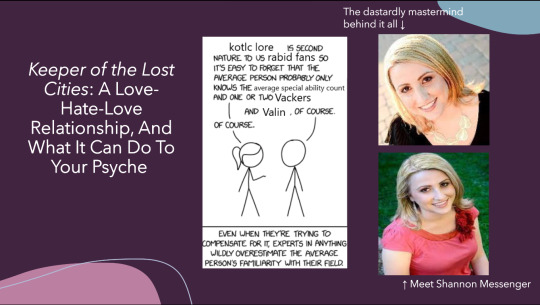
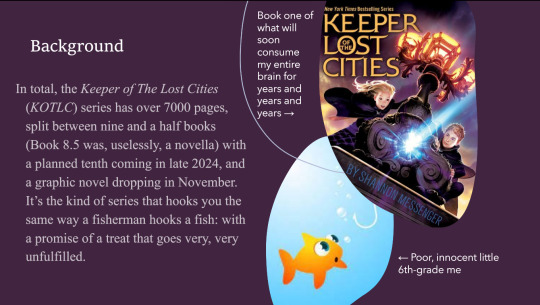
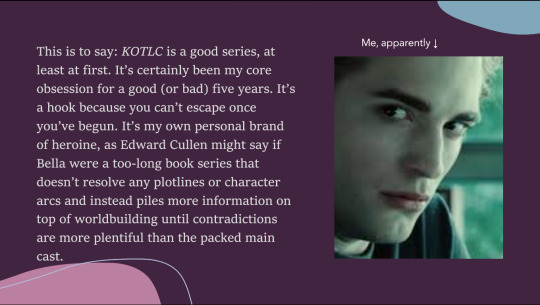

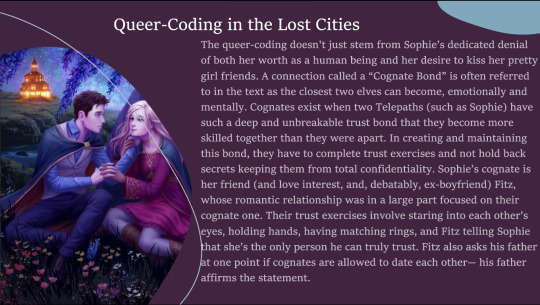





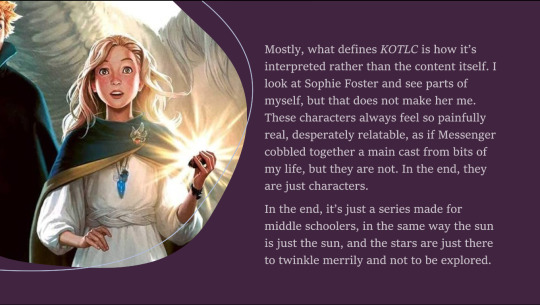
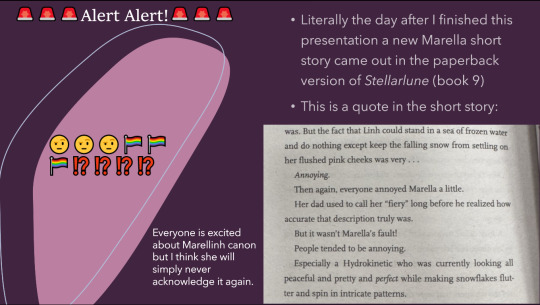


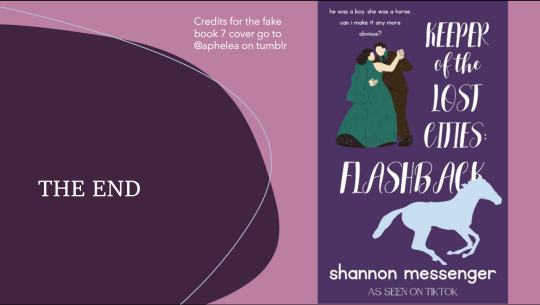
[ID: 15 screenshots of a powerpoint presentation. The text is either white or gray, and the theme is various shades of purple, typically with bubbles of dark/light purple and images.
Slide one: Title reading "Keeper of the Lost Cities: A Love-Hate-Love Relationship, And What It Can Do To Your Psyche" with three images on the side. The first image is a meme of two stick figures, the first saying "kotlc lore is second nature to us rabid fans so it's easy to forget that the average person only knows the average special ability count and one or two vackers", the second figure saying "and valin, of course," and the first saying "of course." with text at the bottom reading "Even when they're trying to compensate for it, experts in anything wildly overcompensate the average person's familiarity with their field." The other two images are of Shannon Messenger, a white woman with blonde hair. The images are captioned "The dastardly mastermind behind it all" and "meet Shannon Messenger".
Slide Two: Title reading "Background" with a block of text and two images. The text reads "In total, the Keeper of The Lost Cities (KOTLC) series has over 7000 pages, split between nine and a half books (Book 8.5 was, uselessly, a novella) with a planned tenth coming in late 2024, and a graphic novel dropping in November. It’s the kind of series that hooks you the same way a fisherman hooks a fish: with a promise of a treat that goes very, very unfulfilled." The top image is the cover of the first keeper of the lost cities book, captioned with "book one of what will soon consume my entire brain for years and years and years" and the bottom image is a fish staring at the top image as if it is a tasty treat, captioned "Poor, innocent little 6th grade me".
Slide Three: A block of text reading "This is to say: KOTLC is a good series, at least at first. It’s certainly been my core obsession for a good (or bad) five years. It’s a hook because you can’t escape once you’ve begun. It’s my own personal brand of heroine, as Edward Cullen might say if Bella were a too-long book series that doesn’t resolve any plotlines or character arcs and instead piles more information on top of worldbuilding until contradictions are more plentiful than the packed main cast." An image of Edward Cullen from twilight is captioned "Me, apparently".
Slide Four: A small caption at the top reads "If the series ever ends you can call me Brant when Jolie asked him to leave the Neverseen the way I will burn down my house and kill everyone I love (haha just a joke to get us going)" with an image of a huge explosion below it. Text reads, "Basically, KOTLC is a good series, but the idea of recommending it feels like I’d be violating several articles of the Geneva Conventions. I wouldn’t wish it on anyone. The thought of it ending is an impossibility on the scale of the apocalypse and I hope (I'd rather) the world ends before this series does."
Slide Five: Titled "Queer-Coding in the Lost Cities" with the image of Sophie Foster and Fitz Vacker on the side. Text reads, "The queer-coding doesn't just stem from Sophie’s dedicated denial of both her worth as a human being and her desire to kiss her pretty girl friends. A connection called a “Cognate Bond” is often referred to in the text as the closest two elves can become, emotionally and mentally. Cognates exist when two Telepaths (such as Sophie) have such a deep and unbreakable trust bond that they become more skilled together than they were apart. In creating and maintaining this bond, they have to complete trust exercises and not hold back secrets keeping them from total confidentiality. Sophie’s cognate is her friend (and love interest, and, debatably, ex-boyfriend) Fitz, whose romantic relationship was in a large part focused on their cognate one. Their trust exercises involve staring into each other’s eyes, holding hands, having matching rings, and Fitz telling Sophie that she’s the only person he can truly trust. Fitz also asks his father at one point if cognates are allowed to date each other— his father affirms the statement."
Slide Six: Titled "Queer-Coding: Qualden, Tiertice, and such other 🤨🏳️🌈 moments" with the text, "Notably, Alden has the authority to do so since he himself was a cognate, only undergoing a nasty breakup— sorry, only losing the bond after his cognate, Quinlin, kept too many secrets. It’s implied that two other characters were once almost Cognates, only to grow too far apart when one of them, Prentice, has his sanity forcibly shattered and is locked in prison, leaving his (gay lover) best friend, Tiergan (code name Granite), to raise his son. The choice to parallel Fitz/Sophie, Alden/Quinlin, and Tiergan/Prentice was possibly not a conscious one, since Messenger has never attempted to hint at the existence of homosexuality before, but it still resonates with hundreds of queer teen readers who look at the portrayal of utter devotion and trust between two men and think, wow. this is what i see in myself." The image is a quote from Neverseen, reading "'What did you give him?' Granite asked, cradling Prentice like a baby. Prentice's head lolled to the side, his body limp and pale." / "Granite held Prentice tighter, whispering, 'It's going to be okay.'"
Slide Seven: Titled "Honorary Errol "I have five identities and they're all the true me" Forkle Mention". Smaller text below reads "Strut it Magnate "I inspired Loki but don’t even ask about the horse thing" Leto!" A picture of Mr. Forkle is next to a tumble post by me about Forkle being trans based on the Loki thing. The slide is decorated with several trans flags.
Slide Eight: Titled "Beauty Standards" with text reading "Speaking of things Shannon Messenger did subconsciously, it’s so painfully clear that this series was written by a white American woman that it makes me break out in hives. Messenger establishes very early on in the series that all elves, no matter who they are, are gorgeous in comparison to humans. For some reason that I’m sure has no correlation to Sophie and therefore Messenger’s personal biases (aka Western hetero/cisnormativity and gender roles), every single elven character is slim with clear skin and no glasses. For some reason, beards seem to be impossible for elves to grow naturally, since the only time facial hair ever appears on anyone’s face is when they take an elixir to change their appearance." An image of Sophie with her human family is captioned "Sophie with her ugly nasty disgusting human family apparently".
Slide Nine: Text reading "Valin is a member of “the drooly boys” who, had they been “human, would’ve been skinny, with acne and braces. Since they were elves, they were fairly good-looking—or they could’ve been if they hadn’t slicked their hair into greasy ponytails” (Messenger KOTLC 170). It seems elves have evolved past the need for brown eyes, acne, crooked teeth, facial hair beyond eyebrows, and variations in body fat—not to mention most other features that make people unique. There is indeed a single elf who is fat and even has wrinkles (elves also don’t physically age past 30, fun fact). He alters his appearance with berries that swell his skin, making him the only unique body type besides Sophie’s human family, who are consistently thrown in terrible comparison to her new, movie-star-looking adoptive parents. The berries also make him smell, interestingly enough." Images of Councillors Zarina, Terik, and Clarette line the right side of the slide.
Slide Ten: Text reading: "By portraying the elves as the standard for beauty and then removing any pimple, stretch mark, fat roll, body hair, crooked tooth, big nose, or any of the thousands of features that add depth to faces and bodies, Messenger tells us that perfection lies in eliminating all “flaws.” She tells her young readers that they are desirable if they look like Sophie, or Biana, or Keefe—not Stina with her curly hair, or Dex’s too-skinny arms, or Forkle’s large stomach, or my human body." The family portrait of the Vackers is also there.
Slide Eleven: Text reading: "Mostly, what defines KOTLC is how it’s interpreted rather than the content itself. I look at Sophie Foster and see parts of myself, but that does not make her me. These characters always feel so painfully real, desperately relatable, as if Messenger cobbled together a main cast from bits of my life, but they are not. In the end, they are just characters. In the end, it’s just a series made for middle schoolers, in the same way the sun is just the sun, and the stars are just there to twinkle merrily and not to be explored." Sophie on the cover of Exile is also there.
Slide Twelve: Text reading "Literally the day after I finished this presentation a new Marella short story came out in the paperback version of Stellarlune (book 9). This is a quote in the short story:" with a picture of the short story of Marella being gay about Linh. Also on the slide is "🚨🚨🚨Alert Alert!🚨🚨🚨" "🤨🤨🤨🏳️🌈🏳️🌈🏳️🌈⁉️⁉️⁉️⁉️" and "Everyone is excited about Marellinh canon but I think she will simply never acknowledge it again."
Slide Thirteen: Just the text "Oh, By The Way, This Series Is Off The Walls Insane"
Slide Fourteen: Text reading "Things that happen in this series: Alicorns have sex and then there is a graphic birth scene (but the Forkle as Loki thing is going too far 🤨), Love Interest confesses his feelings by telling Sophie he wants her to be assigned to marry him by the government, An ogre bodyguard plays matchmaker with her charge and his crush (successfully), There's a guy who can sense "potential" except is definitely lying about this, Villains die so disappointingly. So far we have "hit on head with rock" "smushed by door opened too quickly" "exploded" "fell into evil birthing sauce" (this last one was cool though), and A school principal becomes president" Three tumblr screenshots and memes detailing other things that happen in the book are also there.
Slide Fifteen: THE END. A screenshot captioned with "Credits for the fake book 7 cover go to @/aphelea on tumblr" shows a canva/booktok style fake cover for Flashback, with a dancing couple, a horse, and the words "he was a boy. she was a horse. could I make it any more obvious?"
/end id]
#this id was HELLLLLLL by the way. like I had to take breaks and stuff this was TERRIBLE#i hope it's good enough because fellows. my eye is actively twitching from writing that shit out manually#anyways hope u enjoy the essay might make it somewhere sometime blah blah#summer rambles#kotlc#keeper of the lost cities#the essay was actually mainly about sophie's insecurity but#it's even better w the transitions#i'll have you know my class LOVED this they were giggling and chortling and such#if the quality is bad. well. good thing we have these lovely image descriptions
322 notes
·
View notes
Text

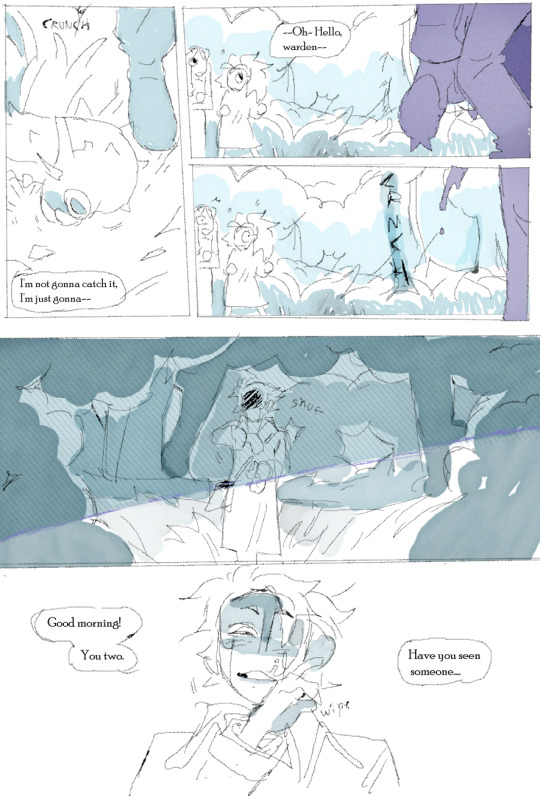



Sugar's still looking for her buddy</3
#hoof draws#replacement ingo au#long post#sugar is the king of misunderstandings apparently#shows up in hisui just trying to find her trainer who got lost in transit. accidentally goes about it in the most ominous way possible#sugar‚ standing half in the shade wiping rattata blood off her face b/c she got caught in the middle of eating: :]c hi#(all of pearl clan is on high alert for a weird zoroark that's apparently trying to kill one of their wardens)
1K notes
·
View notes
Text
tease tidbit tuesday
tagged by @bidisasterevankinard @tizniz 💖
more bucktommy the will talk (they're getting there, the conversation went a bit off track lol) - it might be done this week, and then I can focus on the smut, and the buddie fics, and I have a new bucktommy idea inspired by that video of lou barbecuing with his shirt off that I sooo wanna write🙈
prev snippet
___
“Well, yeah, of course.” Buck answers easily, his heartbeat speeding up. He’s a little anxious about putting too much pressure, too many expectations out there, but he also knows that even if he did, they’d get back on track, they’d be fine. And besides, Tommy’s smiling, he doesn’t seem freaked out at all. And that’s after Buck brought up children. But if they’re moving forward with their relationship, they need to know what they want out of life. It seems reasonable to have this conversation this early on.
“Good.” he responds, grinning widely. “Now I won't have to stress about your answer when I ask.” he adds, and Buck feels himself blush, butterflies in his stomach going wild. Oh. Oh. This is- this is real. They’re talking about it, and maybe someday soon- he might marry this man. He will marry this man. Tommy wants him forever. Tommy wants him. Tommy wants to marry him and have children with him, and just be with him. Sometimes it’s still so shocking to Buck that someone as great and amazing as Tommy wants him, but he does. Buck’s not sure he remembers the last time he felt this wanted.
“How- how do you know I won’t ask first?” Buck asks, moving his head slightly closer to Tommy, just enough to look into his beautiful blue eyes. It feels surreal, talking about this, when they only dated for a few months, but it also feels… right. It feels like they’re on the right track to get there one day.
___
no pressure tags: @elvensorceress @thebravebitch @shortsighted-owl @eddiebabygirldiaz @watchyourbuck @eowon @loserdiaz @evanbegins @ladydorian05 @wildlife4life @diazpatcher @lover-of-mine @monsterrae1 @thewolvesof1998 @weewootruck @loveyouanyway @spagheddiediaz @rainbow-nerdss @epicbuddieficrecs @pirrusstuff @spotsandsocks @alliaskisthepossibilityoflove @nmcggg @rogerzsteven @hippolotamus @giddyupbuck @sunshinediaz @honestlydarkprincess @underwaterninja13 @exhuastedpigeon @911-on-abc @jesuisici33 @steadfastsaturnsrings @buddieswhvre @fortheloveofbuddie @your-catfish-friend @theotherbuckley @daffi-990 @dangerpronebuddie @hoodie-buck @aroeddiediaz @diazsdimples
#tease tidbit tuesday#wikiangela writes#bucktommy fic#im about to start the actual will convo but having trouble transitioning into it so we'll see but should be done this weekend haha#remember when i said i'd write like 2 bucktommy fics and go back to buddie? lmao yeah right#honestly i don't care - bucktommy is the only thing bringing me genuine excitement rn and i'm gonna ride that high as long as i can#if y'all follow me just for buddie - sorry not sorry? lol they'll be back but for now I'm here idk#again if anyone wants to not be tagged in my bucktommy just lmk - and if anyone wants to start being tagged - lmk 💁#fic snippet#my writing#my wips#911 fic#911 abc#bucktommy#tommy kinard#evan buckley#buck x tommy#bucktommy wip#bucktommy the will talk fic#fireflight#firepilot#tevan#<- what shipname are we actually using lmao im lost (bucktommy and fireflight are my faves tho sns)
99 notes
·
View notes
Text





WHO AM I TO YOU? I AM THE ANTICHRIST TO YOU.
#ofmdedit#ourflagmeansdeathedit#ofmd spoilers#ofmd#our flag means death#edits#useravia#userbecca#usernoobie#userelio#blackbonnet#gentlebeard#still so lost on the ship name i'm a fake fan fr#rs: you make me happy#if anyone doesn't want to be tagged feel free to let me know of course ♥#and if could all just collectively pretend this mess of a typography work is not an eyesore#my fragile mental health would be grateful#def in an awkward stage of transition towards another style and i just have to accept it. embrace the mess#anyway. i've been wanting to use this song for someone for ages so let's go babes#we're all both the monster and the lover in someone else's story am i right#flashing gif /
174 notes
·
View notes
Video
youtube
LOST IN TRANSIT - "WOLF"
"WOLF" by @lostintransitjazz
composed by CC
1 note
·
View note
Text


I'm lost.. come find me before i..
#rain#lost#find me#please#transgender#trans#trans pride#transisbeautiful#transgirl#mtf#mtf hrt#girlslikeus#maletofemale#transformation#transwomen#transition#actually trans#mtf trans#this is what trans looks like#trans community#trans fem#trans feminine#trans girl#trans women#trans woman#trans is sexy#mentally fucked#i fucking ruined everything#of course i couldn't keep you#im dying
243 notes
·
View notes
Text
No one mentions it but imagining Lilia just showing up to NRC w an invite from like 300 yrs ago patched together with the medieval version of scotch tape and staples is the funniest shit ever
#lilia vanrouge#like 'hey it got lost in transit ♡'#as if levan didnt do arts and crafts for 2 hrs on it LMAOOO#crowleys just like 🧍🧍🧍 bffr
143 notes
·
View notes
Note
Okay hear me out
What if banana bread… but we put cheese in it?
I have mushed bananas in the freezer ready to be used for bandanna bread. Im listening.
#bones replies#bones culinary crimes#witchhunter you always encourage my horrendous food creations you’re the best#that fish mold got “lost in transit” so im just using a tiny cake mold instead.
39 notes
·
View notes